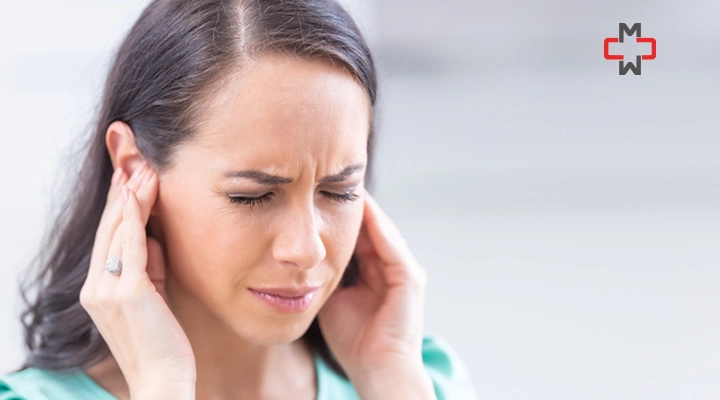Have you ever experienced a persistent ringing or buzzing sound in your ears that just won’t go away? Imagine trying to fall asleep with this constant noise in your head, or attempting to concentrate on your daily tasks while it’s still there.
If you’ve ever found yourself in this situation, you’re not alone. Tinnitus, often described as a phantom noise in the ears, affects millions of people worldwide, impacting their quality of life and causing significant discomfort.
In today’s blog, we’re about to explore the depths of tinnitus to uncover its mysteries and determine ‘how to cure tinnitus’, once and for all.
What Is Tinnitus?
Tinnitus is not a condition itself but rather a symptom of an underlying issue affecting the auditory system. It manifests as a constant ringing, buzzing, hissing, or clicking sound in one or both ears, with no external source producing the noise.
This phantom sound can vary in intensity and pitch, and for some individuals, it can be a minor annoyance, while for others, it can be debilitating, interfering with their daily activities and overall well-being.
How To Cure Tinnitus?
While there is currently no universally accepted cure for tinnitus, various treatment options aim to get rid of tinnitus symptoms and improve the patient’s quality of life.
Tinnitus treatments typically focus on managing underlying conditions, reducing stress and anxiety, and enhancing auditory perception through sound therapy and counseling.
Additionally, lifestyle modifications and alternative therapies may also play a role in managing tinnitus effectively.
Tinnitus Symptoms
Tinnitus presents itself differently for each individual, but common tinnitus symptoms include:
- Ringing, buzzing, hissing, or clicking sounds in the ears
- The sensation of fullness or pressure in the ears
- Difficulty concentrating or sleeping due to the noise
- Irritability and frustration
- Anxiety and depression in severe cases
Causes of Tinnitus
Understanding the causes of tinnitus is important for effective management. Some common factors contributing to tinnitus include:
- Exposure to loud noise or music
- Age-related hearing loss (presbycusis)
- Earwax buildup or blockage
- Ototoxic medications
- Head or neck injuries
- Temporomandibular joint (TMJ) disorders
- Cardiovascular disorders
- Neurological conditions such as Meniere’s disease
Home Remedies for Tinnitus
While medical intervention is often necessary for severe cases of tinnitus, several home remedies and self-care strategies may help alleviate symptoms, including:
- Avoiding exposure to loud noises
- Using white noise machines or fans to mask the ringing
- Practicing relaxation techniques such as yoga and meditation to reduce stress
- Maintaining a healthy lifestyle with regular exercise and balanced nutrition
- Limiting caffeine and alcohol consumption, which can exacerbate tinnitus symptoms
- Trying over-the-counter supplements such as ginkgo biloba or zinc, although evidence of their effectiveness is limited
It’s essential to consult with a healthcare professional before trying any home remedies to ensure they are safe and suitable for your specific condition.
When to See a Doctor?
While occasional ringing in the ears is common and often harmless, persistent or worsening tinnitus warrants medical attention. You should see a doctor if:
- Tinnitus is accompanied by sudden hearing loss, dizziness, or vertigo
- Tinnitus interferes with your ability to concentrate or sleep
- Tinnitus is unilateral (affecting only one ear)
- Tinnitus occurs after a head or neck injury
- Tinnitus is associated with other symptoms such as headache or visual disturbances
Frequently Asked Questions
Can tinnitus go away?
Tinnitus can go away on its own for some people, but for others, it may persist. It depends on the underlying cause and individual factors.
How to stop tinnitus instantly?
There's no instant cure for tinnitus, but using techniques like masking, relaxation, or distraction may provide temporary relief.
What is one nutrient that can fix tinnitus?
There isn't a single nutrient proven to "fix" tinnitus, but some studies suggest that magnesium supplementation might help in certain cases.
What makes tinnitus worse?
Loud noises, stress, caffeine, alcohol, and certain medications can worsen tinnitus symptoms. Additionally, underlying health conditions like hearing loss or TMJ disorders can make tinnitus worse.
– Disclaimer –
This blog is for informational & educational purposes only and does not intend to substitute any professional medical advice or consultation. For any health-related concerns, please consult with your physician, or call 911.
-
About The Author
Dr. Syra Hanif M.D.Board Certified Primary Care Physician
Dr. Syra Hanif is a board-certified Primary Care Physician (PCP) dedicated to providing compassionate, patient-centered healthcare.
Read More







